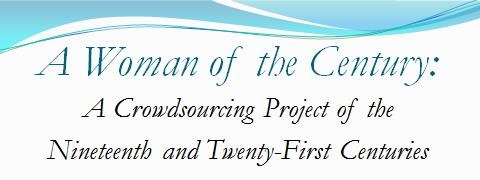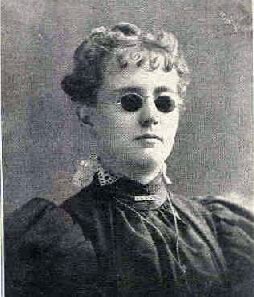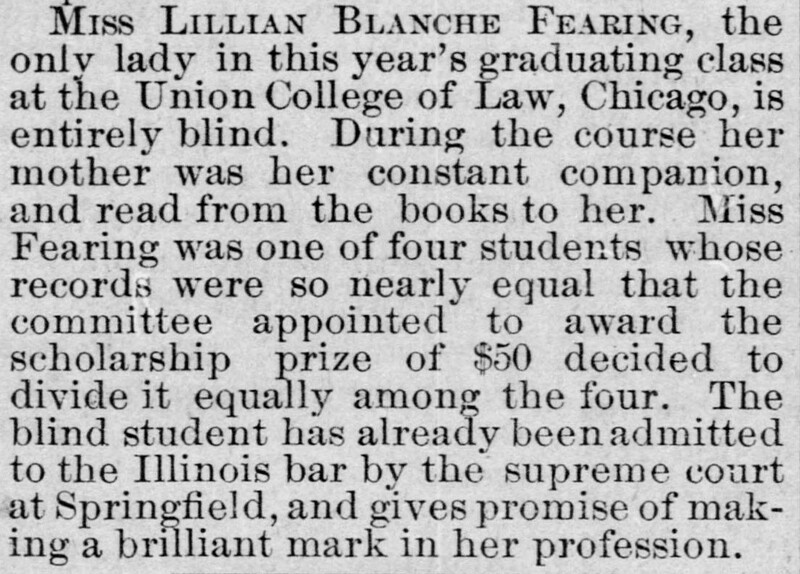Dublin Core
Description
Author and lawyer Lillian Blanche Fearing was born in Davenport, Iowa, on November 27, 1863. Despite being blind from birth, Lillian achieved much during her lifetime. Lillian's obituary in the Rock Island Argus notes, in part:
"At the age of 8 she published her first poem, and by the time she was 12 years old her verses were appearing regularly in the Boston Transcript. Personal letters commending her work were sent her by Oliver Wendell Holmes, John G. Whittier, and Edmund Clarence Stedman."
When she was taking courses at Union College of Law in Chicago, Lillian's mother "was her constant companion and read books to her" (The Comet). When she graduated, Lillian was the only woman in her class and one of four scholarship recipients (Watertown Republican).
Well regarded by her peers, Lillian was one of the people feated in literary critic William Morton Payne's "Literary Chicago" in the February 1893 edition of New England Magazine. The article mentioned many men and women, including Eliza Allen Starr, Olive Thorne Miller, Amanda T. Jones, Harriet Monroe, and Ella Wheeler Wilcox. Payne praised Fearing's work as "remarkable" and, speaking of her poem "In The City By The Lake," he noted: "A note of song stronger and more sustained has hardly been sounded by any other American woman" (696). Readers of New England Magazine would have known of Lillian, since she had published "The Bivouac of Sherman's Army" in that periodical's August 1890 issue.
In 1894, Lillian wrote a piece for Chicago Woman's Times about the need for a different title than Miss for adult single women. She noted that males are called master and then Mr., but that females are addressed as Miss until they are married. She was perturbed that it took marriage to allow a woman to have a mature adult title. Lillian's words were reprinted in the March 10, 1894 edition of The Caldwell Tribune (Idaho Territory), giving her thoughts an even larger audience.
Throughout her life, Lillian received praise in the press for her work as a lawyer, her writing, and her phenomenal work ethic. The Irish Standard's characterization of her serves as a fine example of the admiration Lillian's contemporaries had for her:
"Miss Blanche Fearing is a graduate of the Chicago Law School and surely finding her way to a successful legal career. She is a poet, also, but her verses do not begin with 'whereases' or 'know all men,' etc., but are marked by the true poetic quality. Miss Fearing's profession means a livelihood to her. Her literary work is the overflow of her life. When it is known that Miss Fearing is entirely blind, the courage, enthusiasm, and perseverance that her work in these two lines exhibits fill one with admiration for the beauty and strength of character that so triumph over untoward circumstances and make life so noble, useful and sweet."
She was very fortunate to have a supportive family. According to the Republican News Item, Lillian's mother and sister played the crucial role of reading legal documents to her.
Lillian's image and a discussion about her were included in "Women Lawyers of America," a lengthy December 13, 1896, article in The San Francisco Call. Others noted included local lawyer Clara Shortridge Foltz, Myra Bradwell, Ellen A. Martin, Kate Pier, Ada Miser Kepley, Ella Humphrey Haddock, and Cornelia Hood.
On March 21, 1900, The Western News dedicated an article, "Blind From Infancy: This Girl is Now Widely Known as a Writer and Lawyer." While the use of the word "girl" must not have pleased Lillian, she must have been happy to hear that the paper had written about her and called her "a dual success in her dual professions of author and lawyer."
Unfortunately, Lillian passed away in Eureka Heights, Illinois, later that year. When she died on August 13, 1900, this courageous woman was just thirty-six years old.
"At the age of 8 she published her first poem, and by the time she was 12 years old her verses were appearing regularly in the Boston Transcript. Personal letters commending her work were sent her by Oliver Wendell Holmes, John G. Whittier, and Edmund Clarence Stedman."
When she was taking courses at Union College of Law in Chicago, Lillian's mother "was her constant companion and read books to her" (The Comet). When she graduated, Lillian was the only woman in her class and one of four scholarship recipients (Watertown Republican).
Well regarded by her peers, Lillian was one of the people feated in literary critic William Morton Payne's "Literary Chicago" in the February 1893 edition of New England Magazine. The article mentioned many men and women, including Eliza Allen Starr, Olive Thorne Miller, Amanda T. Jones, Harriet Monroe, and Ella Wheeler Wilcox. Payne praised Fearing's work as "remarkable" and, speaking of her poem "In The City By The Lake," he noted: "A note of song stronger and more sustained has hardly been sounded by any other American woman" (696). Readers of New England Magazine would have known of Lillian, since she had published "The Bivouac of Sherman's Army" in that periodical's August 1890 issue.
In 1894, Lillian wrote a piece for Chicago Woman's Times about the need for a different title than Miss for adult single women. She noted that males are called master and then Mr., but that females are addressed as Miss until they are married. She was perturbed that it took marriage to allow a woman to have a mature adult title. Lillian's words were reprinted in the March 10, 1894 edition of The Caldwell Tribune (Idaho Territory), giving her thoughts an even larger audience.
Throughout her life, Lillian received praise in the press for her work as a lawyer, her writing, and her phenomenal work ethic. The Irish Standard's characterization of her serves as a fine example of the admiration Lillian's contemporaries had for her:
"Miss Blanche Fearing is a graduate of the Chicago Law School and surely finding her way to a successful legal career. She is a poet, also, but her verses do not begin with 'whereases' or 'know all men,' etc., but are marked by the true poetic quality. Miss Fearing's profession means a livelihood to her. Her literary work is the overflow of her life. When it is known that Miss Fearing is entirely blind, the courage, enthusiasm, and perseverance that her work in these two lines exhibits fill one with admiration for the beauty and strength of character that so triumph over untoward circumstances and make life so noble, useful and sweet."
She was very fortunate to have a supportive family. According to the Republican News Item, Lillian's mother and sister played the crucial role of reading legal documents to her.
Lillian's image and a discussion about her were included in "Women Lawyers of America," a lengthy December 13, 1896, article in The San Francisco Call. Others noted included local lawyer Clara Shortridge Foltz, Myra Bradwell, Ellen A. Martin, Kate Pier, Ada Miser Kepley, Ella Humphrey Haddock, and Cornelia Hood.
On March 21, 1900, The Western News dedicated an article, "Blind From Infancy: This Girl is Now Widely Known as a Writer and Lawyer." While the use of the word "girl" must not have pleased Lillian, she must have been happy to hear that the paper had written about her and called her "a dual success in her dual professions of author and lawyer."
Unfortunately, Lillian passed away in Eureka Heights, Illinois, later that year. When she died on August 13, 1900, this courageous woman was just thirty-six years old.
Contributor
Coverage
Person Item Type Metadata
Page(s) in WOC
Name in WOC
Birth Name
WorldCat Identity
Birth Date
Birth Year
Generation
Birthplace
State or Country of Birth
Nationality
Marital Status
Parent
Occupation(s) in WOC
Periodical
Publication
Fearing, Blanche, In The City By The Lake. In Two Books. The Shadow, and The Slave Girl. Chicago: Searle & Gorton, 1892.
These publishers were women.
Haithi Trust
These publishers were women.
Haithi Trust
Fearing, L. Blanche, "The Bivouac of Sherman's Army," The New England Magazine Volume 0008 Issue 6 (Aug 1890), 661-665.
Courtesy of Cornell University Library, Making of America Digital Collection.
Courtesy of Cornell University Library, Making of America Digital Collection.
Places Resided
Location (Address, City/Town, State [if USA] or Country)
Personal Network
Death Date
URL
Lillian Blanche Fearing's Obituary
Rock Island Argus. (Rock Island, Ill.), August 15, 1900, Page 5, Image 5
Rock Island Argus. (Rock Island, Ill.), August 15, 1900, Page 5, Image 5
Bibliography
- Rock Island Argus. (Rock Island, Ill.), 15 Aug. 1900. Chronicling America: Historic American Newspapers. Lib. of Congress. <http://chroniclingamerica.loc.gov/lccn/sn92053934/1900-08-15/ed-1/seq-5/>
- The Western news. (Stevensville, Mont.), 21 March 1900. Chronicling America: Historic American Newspapers. Lib. of Congress. <http://chroniclingamerica.loc.gov/lccn/sn84036207/1900-03-21/ed-1/seq-3/>
- The comet. (Johnson City, Tenn.), 17 July 1890. Chronicling America: Historic American Newspapers. Lib. of Congress. <http://chroniclingamerica.loc.gov/lccn/sn89058128/1890-07-17/ed-1/seq-1/>
- Watertown republican. (Watertown, Wis.), 23 July 1890. Chronicling America: Historic American Newspapers. Lib. of Congress. <http://chroniclingamerica.loc.gov/lccn/sn85033295/1890-07-23/ed-1/seq-7/>
- St. Paul daily globe. (Saint Paul, Minn.), 13 June 1892. Chronicling America: Historic American Newspapers. Lib. of Congress. <http://chroniclingamerica.loc.gov/lccn/sn90059522/1892-06-13/ed-1/seq-4/>
- The Hartford republican. (Hartford, Ky.), 13 Jan. 1893. Chronicling America: Historic American Newspapers. Lib. of Congress. <http://chroniclingamerica.loc.gov/lccn/sn86069313/1893-01-13/ed-1/seq-1/>
- Payne, William Morton, "Literary Chicago," The New England Magazine Volume 0013 Issue 6 (February 1893), 683-701.
Courtesy of Cornell University Library, Making of America Digital Collection.
- The Caldwell tribune. (Caldwell, Idaho Territory [Idaho]), 10 March 1894. Chronicling America: Historic American Newspapers. Lib. of Congress. <http://chroniclingamerica.loc.gov/lccn/sn86091092/1894-03-10/ed-1/seq-3/>
- he Irish standard. (Minneapolis, Minn. ;), 26 Oct. 1895. Chronicling America: Historic American Newspapers. Lib. of Congress. <http://chroniclingamerica.loc.gov/lccn/sn90059959/1895-10-26/ed-1/seq-2/>
- The San Francisco call. (San Francisco [Calif.]), 15 Aug. 1897. Chronicling America: Historic American Newspapers. Lib. of Congress. <http://chroniclingamerica.loc.gov/lccn/sn85066387/1897-08-15/ed-1/seq-23/>


